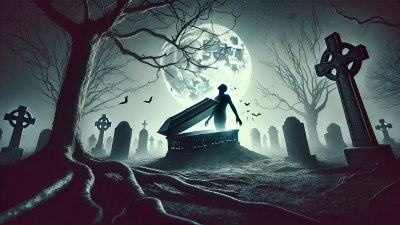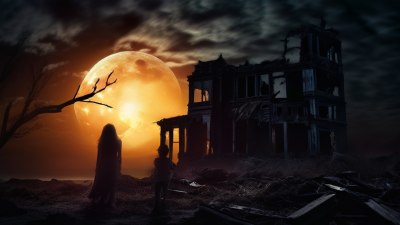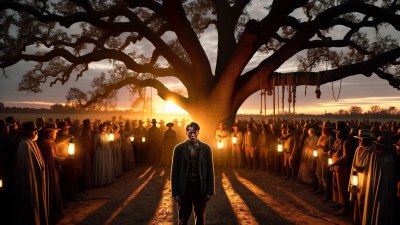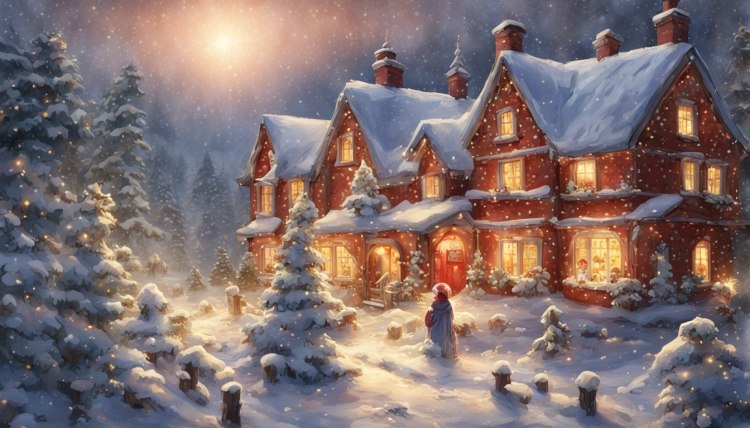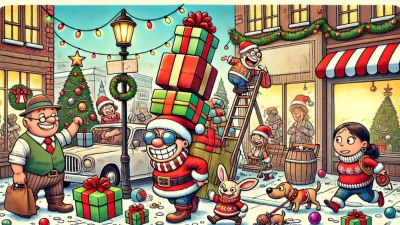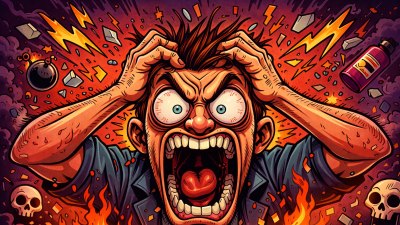The Ghost of Washington (Ghost Story)
Embark on a fascinating journey through time with John Reilly, a cyclist on a Christmas morning adventure in eastern Pennsylvania. Reilly's encounter with the mysterious and historical Valley Forge takes a surreal turn...
It was early on Christmas morning when John Reilly wheeled away from a picturesque little village where he had passed the previous night, to continue his cycling tour through eastern Pennsylvania. To-day his intention was to stop at Valley Forge, and then to ride on up the Schuylkill Valley, visiting in turn the many points of historical interest that lay along his route. Valley Forge, his road map indicated, was but a short distance further on. All around him were the hills and fields and roads over which Washington and his half-starved army had foraged and roamed throughout the trying winter of 1777-8--one hundred and twenty-six years ago.
It was a beautiful Christmas day, truly, and, as he wheeled along, young Reilly’s thoughts were almost equally divided between the surrounding pleasant scenery and the folks at home, who, he knew very well, were assembling at just about the present time around a heavily laden Christmas tree in the front parlor. The sun rose higher and higher and Reilly pedaled on down the valley, passing every now and then quaint, pleasant-looking farmhouses, many of which, no doubt, had been built anterior to the period which had given the vicinity its history.
Arriving, finally, at a place where the road forked off in two directions, Reilly was puzzled which way to go on. There happened to be a dwelling close by. Accordingly he dismounted, left his wheel leaning against a gate-post at the side of the road, and walked up a wretchedly flagged walk leading to the house, with the idea of getting instructions from its inmates.
Situated in the center of an unkempt field of rank grass and weeds, the building lay back from the highway probably one hundred and fifty feet. It was long and low in shape, containing but one story and having what is termed a gabled roof, under which there must have been an attic of no mean size. On coming close to the house, a fact Reilly had not noticed from the road became plainly evident. It was deserted. He saw that the roof and side shingles were in wretched condition; that the window sashes and frames as well as the doors and door frames were missing from the openings in the side walls where once they had been, and that the entire side of the house, including that part of the stone foundation which showed above the ground, was full of cracks and seams. At first on the point of turning back, he concluded to see what the interior was like anyway.
Accordingly he went inside. Glancing around the large dust-filled room he had entered his gaze at first failed to locate any object of the least interest. A rickety appearing set of steps went up into the attic from one side of the apartment and over in one corner was a large open fireplace, from the walls of which much of the brickwork had become loosened and fallen out. Reilly had started up the steps toward the attic, when happening to look back for an instant, his attention was attracted to a singular-looking, jug-shaped bottle no larger than a vinegar cruet, which lay upon its side on the hearth of the fireplace, partly covered up by debris of loose bricks and mortar. He hastened back down the steps and crossed the room, taking the bottle up in his hand and examining it with curiosity. Being partly filled with a liquid of some kind or other the bottle was very soon uncorked and held under the young man’s nose. The liquid gave forth a peculiar, pungent and inviting odor. Without further hesitation Reilly’s lips sought the neck of the bottle. It is hardly possible to describe the pleasure and satisfaction his senses experienced as he drank.
While the fluid was still gurgling down his throat a heavy hand was placed most suddenly on his shoulder and his body was given a violent shaking. The bottle fell to the floor and was broken into a hundred pieces.
“Hello!” said a rough voice almost in Reilly’s ear. “Who are you, anyway? And what are you doing within the lines? A spy, I’ll be bound.”
As most assuredly there had been no one else in the vicinity of the building when he had entered it and with equal certainty no one had come down the steps from the attic, Reilly was naturally surprised and mystified by this unexpected assault. He struggled instinctively to break loose from the unfriendly grasp, and when he finally succeeded he twisted his body around so that he faced across the room. Immediately he made the remarkable discovery that there were four other persons in the apartment--three uncouth-looking fellows habited in fantastic but ragged garments, and a matronly-looking woman, the latter standing over a washtub which had been elevated upon two chairs in a corner near the fireplace. To all appearance the woman had been busy at her work and had stopped for the moment to see what the men were going to do; her waist sleeves were rolled up to the shoulders and her arms dripped with water and soapsuds. Over the tops of the tubs, partly filled with water, there were visible the edges of several well-soaked fabrics. Too add to his astonishment he noticed that in the chimney-place, which a moment before was falling apart, but now seemed to be clean and in good condition, a cheerful fire burned, and that above the flames was suspended an iron pot, from which issued a jet of steam. He noticed also that the entire appearance of the room had undergone a great change. Everything seemed to be in good repair, tidy and neat; the ceilings, the walls and the door; even the stairway leading to the attic. The openings in the walls were fitted with window sashes and well-painted doors. The apartment had, in fact, evolved under his very eyesight from a state of absolute ruin into one of excellent preservation.
All of this seemed so weird and uncanny, that Reilly stood for a moment or two in the transformed apartment, utterly dumbfounded, with his mouth wide open and his eyes all but popping out of his head. He was brought to his senses by the fellow who had shaken him growling out:
“Come! Explain yourself!”
“An explanation is due me,” Reilly managed to gasp.
“Don’t bandy words with the rascal, Harry,” one of the other men spoke up. “Bring him along to headquarters.”
Thereupon, without further parley, the three men marched Reilly in military fashion into the open air and down to the road. Here he picked up at the gate-post his bicycle, while they unstacked a group of three old-fashioned-looking muskets located close by. When the young man had entered the house a few minutes before, this stack of arms had not been there. He could not understand it. Neither could he understand, on looking back at the building as he was marched off down the road, the mysterious agency that had transformed its dilapidated exterior, just as had been the interior, into a practically new condition.
While they trudged along, the strangers exhibited a singular interest in the wheel Reilly pushed at his side, running their coarse hands over the frame and handle-bar, and acting on the whole as though they never before had seen a bicycle. This in itself was another surprise. He had hardly supposed there were three men in the country so totally unacquainted with what is a most familiar piece of mechanism everywhere.
At the same time that they were paying so much attention to the wheel, Reilly in turn was studying with great curiosity his singular-looking captors. Rough, unprepossessing appearing fellows they were, large of frame and unshaven, and, it must be added, dirty of face. What remained of their very ragged clothing, he had already noticed, was of a most remarkable cut and design, resembling closely the garments worn by the Continental militiamen in the War of Independence. The hats were broad, low of crown, and three-cornered in shape; the trousers were buff-colored and ended at the knees, and the long, blue spike-tailed coats were flapped over at the extremities of the tails, the flaps being fastened down with good-sized brass buttons. Leather leggings were strapped around cowhide boots, through the badly worn feet of which, in places where the leather had cracked open, the flesh, unprotected by stockings, could be seen. Dressed as he was, in a cleanly, gray cycling costume, Reilly’s appearance, most assuredly, was strongly in contrast to that of his companions.
After a brisk walk of twenty minutes, during which they occasionally met and passed by one or two or perhaps a group of men clothed and outfitted like Reilly’s escorts, the little party followed the road up a slight incline and around a well-wooded bend to the left, coming quite suddenly, and to the captive, very unexpectedly, to what was without doubt a military encampment; a village, in fact, composed of many rows of small log huts. Along the streets, between the buildings, muskets were stacked in hundreds of places. Over in one corner, on a slight eminence commanding the road up which they had come, and cleverly hidden from it behind trees and shrubbery, the young man noticed a battery of field pieces. Wherever the eye was turned on this singular scene were countless numbers of soldiers all garmented in three-cornered hats, spike-tailed coats and knee breeches, walking lazily hither and thither, grouped around crackling fires, or parading up and down the streets in platoons under the guidance of ragged but stern-looking officers.
Harry stopped the little procession of four in front of one of the larger of the log houses. Then, while they stood there, the long blast from a bugle was heard, followed by the roll of drums. A minute or two afterward, several companies of militia marched up and grounded their arms, forming three sides of a hollow square around them, the fourth and open side being toward the log house. Directly succeeding this maneuver there came through the doorway of the house and stepped up the center of the square, stopping directly in front of Reilly, a dignified-looking person, tall and straight and splendidly proportioned of figure, and having a face of great nobility and character.
The cold chills chased one another down Reilly’s back. His limbs swayed and tottered beneath his weight. He had never experienced another such sensation of mingled astonishment and fright.
He was in the presence of General Washington. Not a phantom Washington, either, but Washington in the flesh and blood; as material and earthly a being as ever crossed a person’s line of vision. Reilly, in his time, had seen so many portraits, marble busts and statues of the great commander that he could not be mistaken. Recovering the use of his faculties, which for the moment he seemed to have lost, Reilly did the very commonplace thing that others before him have done when placed unexpectedly in remarkable situations. He pinched himself to make sure that he was in reality wide awake and in the natural possession of his senses. He felt like pinching the figure in front of him also, but he could not muster up the courage to do that. He stood there trying to think it all out, and as his thoughts became less stagnant, his fright dissolved under the process of reasoning his mind pursued. To reason a thing out, even though an explanation can only be obtained by leaving much of the subject unaccounted for, tends to make one bolder and less shaky in the knees.
The series of strange incidents which he was experiencing had been inaugurated in the old-fashioned dwelling he had visited after information concerning the roads. And everything had been going along in a perfectly normal way up to, the very moment when he had taken a drink from the bottle found in the fireplace. But from that precise time everything had gone wrongly. Hence the inference that the drinking of the peculiar liquid was accountable in some way or other for his troubles. There was a supernatural agency in the whole thing. That much must be admitted. And whatever that agency was, and however it might be accounted for, it had taken Reilly back into a period of time more than a hundred years ago, and landed him, body and soul, within the lines of the patriot forces wintering at Valley Forge. He might have stood there, turning over and over in his mind, pinching himself and muttering, all the morning, had not the newcomer ceased a silent but curious inspection of his person, and asked: “Who are you, sir?”
“John Reilly, at your pleasure,” the young man replied, adding a question on his own account: “And who are you, sir?”
Immediately he received a heavy thump on his back from Harry’s hard fist.
“It is not for you to question the general,” the ragged administrator of the blow exclaimed.
“And it is not for you to be so gay,” Reilly returned, angrily, giving the blow back with added force.
“Here, here!” broke in the first questioner. “Fisticuffs under my very nose! No more of this, I command you both.” To Harry he added an extra caution: “Your zeal in my behalf will be better appreciated by being less demonstrative. Blows should be struck only on the battlefield.” To Reilly he said, with a slight smile hovering over his face, “My name is Washington. Perhaps you may have heard of me?”
To this Reilly replied: “I have, indeed, and heard you very well spoken of, too.” Emboldened by the other’s smile, he ventured another question: “I think my reckoning of the day and year is badly at fault. An hour ago I thought the day was Christmas day. How far out of the way did my calculation take me, sir?”
“The day is indeed Christmas day, and the year is, as you must know, the year of our Lord one thousand seven hundred and seventy-seven.”
Reilly again pinched himself.
“Why do you bring this man to me?” Washington now inquired, turning to Harry and his companions.
“He is a spy, sir,” said Harry.
“That is a lie!” Reilly indignantly interpolated. “I have done nothing to warrant any such charge.”
“We found him in the Widow Robin’s house, pouring strong liquor down his throat.”
“I had gone inside after information concerning the roads----”
“Which he was getting from a bottle, sir.”
“If drinking from a bottle of necessity constitutes being a spy, I fear our camp is already a hotbed,” Washington somewhat sagely remarked, casting his eye around slyly at his officers and men. “Tell me,” he went on, with sudden sternness, looking Reilly through and through, as though to read his very thoughts, “is the charge true? Do you come from Howe?”
“The charge is not true, sir. I come from no one. I simply am making a tour of pleasure through this part of the country on my bicycle.”
“With the country swarming with the men from two hostile armies, any kind of a tour, save one of absolute necessity, seems ill-timed.”
“When I set out I knew nothing about any armies. The fact is, sir----” Reilly started to make an explanation, but he checked himself on realizing that the telling of any such improbable yarn would only increase the hazardousness of his position.
“Well?” Washington questioned, in a tone of growing suspicion.
“I certainly did not know that your army or any other army was quartered in this vicinity.” Reilly hesitated for lack of something further to say. “You see,” he finally added, prompted by a happy idea, “I rode my wheel from New York.”
“You may have come from New York, though it is hard to believe you came on that singular-looking machine so great a distance. Where is the horse which drew the vehicle?”
Reilly touched his bicycle. “This is the horse, sir, just as it is; the vehicle,” he said.
“The man is crazy!” Harry exclaimed. Washington only looked the incredulity he felt, and this time asked a double question.
“How can the thing be balanced without it be held upright by a pair of shafts from a horse’s back, and how is the motive power acquired?”
For an answer Reilly jumped upon the wheel, and at a considerable speed and in a haphazard way pedaled around the space within the hollow square of soldiers. Hither and thither he went, at one second nearly wheeling over the toes of the line of astonished, if not frightened, militiamen; at the next, bearing suddenly down on Harry and his companions and making them dance and jump about most alertly to avoid a collision. Even the dignified Washington was once or twice put to the necessity of dodging hurriedly aside when his equilibrium was threatened. Reilly eventually dismounted, doing so with assumed clumsiness by stopping the wheel at Harry’s back and falling over heavily against the soldier. Harry tumbled to the ground, but Reilly dexterously landed on his feet. At once he began offering a profusion of apologies.
“You did that by design!” Harry shouted, jumping to his feet. His face was red with anger and he shook his fist threateningly at the bicyclist.
Washington commanded the man to hold his peace. Then to Reilly he expressed a great surprise at his performance and a desire to know more about the bicycle. The young man thereupon described the machine minutely, lifting it into the air and spinning the wheels to illustrate how smoothly they rotated.
“I can see it is possible to ride the contrivance with rapidity. It has been put together with wonderful ingenuity,” Washington said, when Reilly had replaced the wheel on the ground.
“And you, sir, it is but a toy,” an officer spoke up. “Put our friend on his bundle of tin and race him against one of our horsemen and he would make a sorry showing.”
Reilly smiled. “I bear the gentleman no ill-will for his opinion,” he said. “Still, I should like to show him by a practical test of the subject that his ignorance of it is most profound.”
“You would test the speed of the machine against that of a horse?” Washington said, in amazement.
“I would, sir. You have a good road yonder. With your permission and a worthy opponent I would make the test at once.”
“But, sir, the man is a spy,” Harry broke in. “Would it not be better to throw a rope around his neck and give him his deserts?”
“The charge is by no means proven,” Washington replied. “Nor can it be until a court martial convenes this afternoon. And I see no reason why we may not in the meantime enjoy the unique contest which has been suggested. It will make a pleasant break in the routine of camp life.”
A murmur of approval went up from the masses of men by whom they were surrounded. While they had been talking it seemed as though everybody in the camp not already on the scene had gathered together behind the square of infantry.
“Then, sir,” Harry said, with some eagerness, “I would like to be the man to ride the horse. There is no better animal than mine anywhere. And I understand his tricks and humors quite well enough to put him to his best pace.”
“I confess I have heard you well spoken of as a horseman,” Washington said. “Be away with you! Saddle and bridle your horse at once.”
It was the chain of singular circumstances narrated above which brought John Reilly into the most remarkable contest of his life. He had entered many bicycle races at one time or other, always with credit to himself and to the club whose colors he wore. And he had every expectation of making a good showing to-day. Yet a reflection of the weird conditions which had brought about the present contest took away some of his self-possession when a few minutes later he was marched over to the turnpike and left to his own thoughts, while the officers were pacing out a one mile straightaway course down the road.
After the measurements had been taken, two unbroken lines of soldiers were formed along the entire mile; a most evident precaution against Reilly leaving the race course at any point to escape across the fields. Washington came up to him again, when the preparations were completed, to shake his hand and whisper a word or two of encouragement in his ear. Having performed these kindly acts he left to take up a position near the point of finish.
The beginning of the course was located close to the battery of half concealed field pieces. Reilly was now conducted to this place. Shortly afterward Harry appeared on his horse. He leered at the bicyclist contemptuously and said something of a sarcastic nature partly under his breath when the two lined up, side by side, for the start. To these slights Reilly paid no heed; he had a strong belief that when the race was over there would be left in the mutton-like head of his opponent very little of his present inclination toward the humorous. The soldier’s mount was a handsome black mare, fourteen and a half hands high; strong of limbs and at the flanks, and animated by a spirit that kept her prancing around with continuous action. It must be admitted that the man rode very well. He guided the animal with ease and nonchalance when she reared and plunged, and kept her movements confined to an incredibly small piece of ground, considering her abundance of action.
“Keep to your own side of the road throughout the race. I don’t want to be collided with by your big beast,” Reilly cautioned, while they were awaiting two signals from the starter.
To this Harry replied in some derision, “I’ll give you a good share of the road at the start, and all of it and my dust, too, afterward.” And then the officer who held the pistol fired the first shot.
Reilly was well satisfied with the conditions under which the race was to be made. The road was wide and level, smooth, hard and straight, and a strong breeze which had sprung up, blew squarely against his back. His wheel was geared up to eighty-four inches; the breeze promised to be a valuable adjunct in pushing it along. Awaiting the second and last signal, Reilly glanced down the two blue ranks of soldiers, which stretched away into hazy lines in the distance and converged at the termination of the course where a flag had been stuck into the ground. The soldiers were at parade rest. Their unceasing movements as they chatted to one another, turning their bodies this way and that and craning their heads forward to look toward the starting point, and then jerking them back, made the lines seem like long, squirming snakes. At the end of the course a thick bunch of militiamen clogged the road and overspread into the fields.
Crack! The signal to be off. Reilly shoved aside the fellow who had been holding his wheel upright while astride of it, and pushed down on the pedals. The mare’s hoofs dug the earth; her great muscular legs straightened out; she sprang forward with a snort of apparent pleasure, taking the lead at the very start. Reilly heard the shout of excitement run along the two ranks of soldiers. He saw them waving their arms and hats as he went by. And on ahead through the cloud of dust there was visible the shadow-like outlines of the snorting, galloping horse, whose hoof beats sounded clear and sharp above the din which came from the sides of the highway. The mare crept farther and farther ahead. Very soon a hundred feet or more of the road lay between her and the bicyclist. Harry turned in his saddle and called out another sarcasm.
“I shall pass you very soon. Keep to your own side of the road!” Reilly shouted, not a bit daunted by the way the race had commenced. His head was well down over the handle-bars, his back had the shape of the upper portion of an immense egg. Up and down his legs moved; faster and faster and faster yet. He went by the soldiers so rapidly that they only appeared to be two streaks of blurry color. Their sharp rasping shouts sounded like the cracking of musketry. The cloud of dust blew against the bicyclist’s head and into his mouth and throat. When he glanced ahead again he saw with satisfaction that the mare was no longer increasing her lead. It soon became evident even that he was slowly cutting down the advantages she had secured.
Harry again turned his head shortly afterward, doubtless expecting to find his opponent hopelessly distanced by this time. Instead of this Reilly was alarmingly close upon him. The man ejaculated a sudden oath and lashed his animal furiously. Straining every nerve and sinew the mare for the moment pushed further ahead. Then her pace slackened a bit and Reilly again crept up to her. Closer and closer to her than before, until his head was abreast of her outstretched tail. Harry was lashing the mare and swearing at her unceasingly now. But she had spurted once and appeared to be incapable of again increasing her speed. In this way they went on for some little distance, Harry using his whip brutally, the mare desperately struggling to attain a greater pace, Reilly hanging on with tenacity to her hind flanks and giving up not an inch of ground.
A mile is indeed a very short distance when traversed at such a pace. The finishing flag was already but a few hundred feet further on. Reilly realized that it was time now to go to the front. He gritted his teeth together with determination and bent his head down even further toward his front wheel. Then his feet began to move so quickly that there was only visible an indistinct blur at the sides of his crank shaft. At this very second, with a face marked with rage and hatred, Harry brought his horse suddenly across the road to thet part of it which he had been warned to avoid.
It is hard to tell what kept Reilly from being run into and trampled under foot. An attempt at back pedaling, a sudden twist of the handle-bar, a lurch to one side that almost threw him from his seat. Then, in the fraction of a second he was over on the other side of the road, pushing ahead of the mare almost as though she were standing still. The outburst of alarm from the throats of the soldiers changed when they saw that Reilly had not been injured; first into a shout of indignation at the dastardly attempt which had been made to run him down, and then into a roar of delight when the bicyclist breasted the flag a winner of the race by twenty feet.
As he crossed the line Reilly caught a glimpse of Washington. He stood close to the flag and was waving his hat in the air with the enthusiasm of a schoolboy. Reilly went on down the road slackening his speed as effectively as he could. But before it was possible to entirely stop his wheel’s momentum the noisy acclamations in his rear ceased with startling suddenness. He turned in his saddle and looked back. As sure as St. Peter he had the road entirely to himself. There wasn’t a soldier or the ghost of a soldier in sight.
As soon as he could he turned his bicycle about and rode slowly back along the highway, now so singularly deserted, looking hither and thither in vain for some trace of the vanished army. Even the flag which had been stuck into the ground at the end of the one-mile race course was gone. The breeze had died out again and the air was tranquil and warm. In the branches of a nearby tree two sparrows chirped and twittered peacefully. Reilly went back to the place where the camp had been. He found there only open fields on one side of the road and a clump of woodland on the other. He continued on down the little hill up which Harry and his companions had brought him a few hours previously and followed the road on further, coming finally to the fork in it near which was located the old farmhouse wherein he had been taken captive. The house was, as it had been when he had previously entered it, falling apart from age and neglect. When he went inside he found lying on the brick hearth in front of the fireplace a number of pieces of broken glass.
👻
This story is part of "Twenty-Five Ghost Stories" by W. Bob Holland. Read all the stories from this enchanting collection HERE!
✍✍✍
The story you've just experienced is a work of fiction, a creation of the imagination meant to entertain, provoke thought, and inspire. From the heart-fluttering highs of love stories to the spine-tingling chills of horror, these stories are unbound by the mundane. Whether you're in the mood for a quick escape or a deep dive into fantastical realms, explore the place where imagination echoes beyond the ordinary - Echoes of Imagination!
